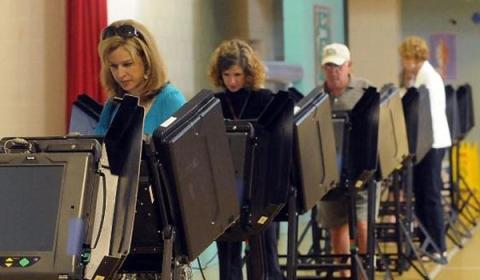Opponents of Arizona’s Proposition 121 warn that the “top two” primary system might be gamed by the two major parties, leaving voters confused and/or with fewer choices. They warn that a party might work to keep all but one of its members from entering the open primary, thereby increasing his or her odds of garnering enough votes to move on to the general election.
games-man-ship [geymz-muhn-ship] nounThe use of methods that are dubious or seemingly improper but not strictly illegal.
Under our current system, party leaders often anoint a preferred candidate and discourage others from running, to spare their favorite from a bruising, expensive primary campaign. Whether a party’s incentive to discourage some potential candidates would be greater or less under the “top two” system is unclear, because their preferred candidate would still have to compete in the open primary. They would essentially be putting all their eggs in one basket.
Another assertion is that a party might field sham candidates posing as members of the other party in an attempt to fragment the opposition vote. This tactic can easily backfire, and only works if the electorate are uninformed. But again, such sham candidacies have occurred under the current system, in some cases leading to legal challenges.Currently, in Arizona’s Congressional District 3, moderate Republican Blanca Guerra is running as a Libertarian, because under current law, Libertarians don’t have to gather as many nominating petitions as Democrats or Republicans. She has stated that she is running to prevent conservative Republican Gabriela Saucedo Mercer from defeating liberal Democrat Raul Grijalva. Under Prop. 121, a candidate could still attempt to play the spoiler role, but only in the primary, not the general election.
Another form of gamesmanship long practiced under the current system is candidates presenting themselves as ideologically extreme in order to win a partisan primary, and then quickly tacking to the center prior to the general election. This ploy, described by an aide to Governor Romney as “shaking the Etch-a-Sketch,” is common and voters have come to expect it.Congressman and U.S. senate candidate Jeff Flake was forced to emphasize his conservative credentials in a hard-fought primary against a conservative opponent with deep pockets; he has been scrambling to the political center since. This strategy would be pointless, and even counter-productive under an open primary system, since candidates would have to appeal to the entire electorate in both the primary and general elections.
Congressman Flake’s opponent in the Senate race is Richard Carmona, former Surgeon General for a Republican administration and self-avowed life-long Independent. He is running against Flake as a Democrat while highlighting his differences with key Democratic positions. One of the goals of Prop. 121 backers was to “level the playing field” and make it possible for candidates to successfully campaign as Independents without party support.
On balance it appears that the incentives for parties to try to game the system are unlikely to increase if Arizona's Proposition 121 passes. In fact, a strong argument can be made that the “top two” primary system might actually decrease political gamesmanship.
